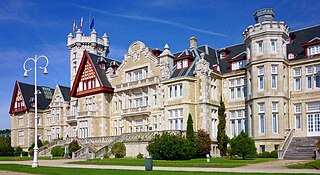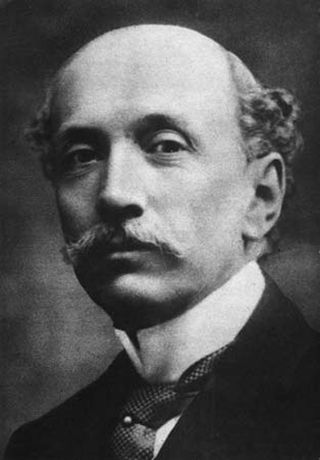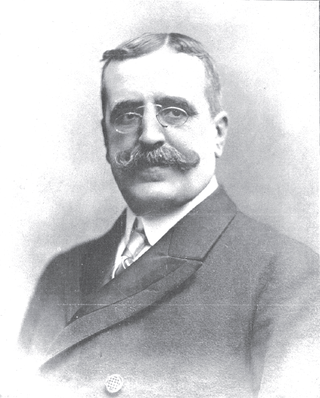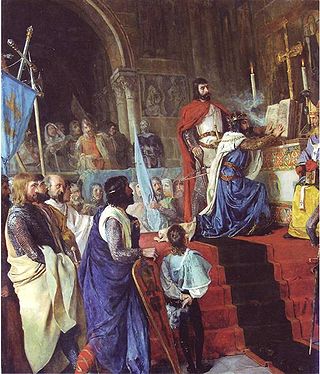Contents
| |||||
| Decades: | |||||
|---|---|---|---|---|---|
| See also: | Other events of 1912 List of years in Spain | ||||
Events in the year 1912 in Spain .
| |||||
| Decades: | |||||
|---|---|---|---|---|---|
| See also: | Other events of 1912 List of years in Spain | ||||
Events in the year 1912 in Spain .

Santander is the capital of the autonomous community of Cantabria, Spain. It has a population of 172,000 (2017). It is a port city located in the northern coast of the Iberian Peninsula, facing the Cantabrian Sea.

Marcelino Menéndez y Pelayo was a Spanish scholar, historian and literary critic. Even though his main interest was the history of ideas, and Hispanic philology in general, he also cultivated poetry, translation and philosophy. He was nominated for the Nobel Prize in Literature five times.

Eduardo Dato e Iradier was a Spanish political leader during the Spanish Restoration period. He served three times as Spanish prime minister: from 27 October 1913 to 9 December 1915, from 11 June 1917 to 3 November 1917, and from 28 April 1920 until his assassination by Catalan anarchists. He also held eleven cabinet ministries, and was four times president of the Spanish Congress of Deputies.

José Canalejas y Méndez was a Spanish politician, born in Ferrol, who served as Prime Minister of Spain from 1910 until his assassination in 1912.
Menéndez or Menendez is a Spanish name of Germanic origin. In English, the name is often spelled without the diacritic. A shorter form sharing the same root is Mendez.

Manuel García Prieto, 1st Marquis of Alhucemas was a Spanish politician who served as prime minister several times in his life and as the 30th Solicitor General of Spain. He was a member of the Liberal Party. During his last term, he was deposed by Miguel Primo de Rivera.
Marcelino is a surname that originated in Spain. There are also several families with the Marcelino surname in Philippines, Portugal, and the Americas.
The period spanning from 1916 to 1930 in Argentina is known as the Radical Phase, as it began with the election of the Radical Civic Union candidate Hipólito Yrigoyen, ending the conservative Generation of '80's domination on politics. Yrigoyen's second term, which started in 1928, was interrupted by Argentina's first military coup, which established José Félix Uriburu in power and initiated the Infamous Decade.

Armando José Isabel García-Menocal y García-Menocal, commonly known as Armando Menocal, was a Cuban painter and educator.

Menéndez Pelayo International University is a public university with administrative headquarters in Madrid and campuses in Santander, Valencia, Barcelona, Cartagena, Cuenca, Granada, La Línea de la Concepción, Seville and Tenerife. The University also conducts classes at the Luis Seoane Foundation in A Coruña and the Huesca campus of the University of Zaragoza.
The Menéndez Pelayo International Prize has been awarded since 1987 by the Menéndez Pelayo International University (UIMP) with the objective of honoring those persons whose literary or scientific work has a humanistic orientation and application, in the tradition of the University's namesake Marcelino Menéndez y Pelayo. It was established with the generous support of Eulalio Ferrer, a Spanish-Mexican entrepreneur and academician. Citizens of any Spanish- or Portuguese-speaking country are eligible. Nominations for the prize are made by universities and academies, as well as other organizations involved in the literary, humanistic or scientific cultures of those countries. The panel of judges is composed of the following persons:

Menéndez Pelayo is a station on Line 1 of the Madrid Metro. It is located in Zone A. It was opened on 8 May 1923. It is named for the Avenida de Menéndez Pelayo, which is named in turn for the scholar Marcelino Menéndez y Pelayo (1856–1912).

María Josefa Mujía (1812–1888) was a Bolivian poet. Blind from the age of 14, she was one of Bolivia's first Romantic poets and is considered the country's first woman writer following its independence. Her poetry was lauded for its sincerity and lyricism, while its dark and sorrowful content earned her the moniker "la Alondra del dolor".

The Real Academia de Ciencias Morales y Políticas is a forum for the sharing of social, economic, philosophical, political and juridical knowledge. It was created on 30 September 1857, by Royal Decree, during the reign of the Queen Isabella II.

The Civil Order of Alfonso XII is a Spanish honorific decoration named for King Alfonso XII (1857–1885). It was established by Royal Decree on 23 May 1902 to reward achievements in education, science, culture, teaching and research.
Francisco Pons y Boigues (1861-1899) was a Spanish Arabist and historian.

The statue of Marcelino Menéndez y Pelayo is a monument in Madrid, Spain. A work by Lorenzo Coullaut Valera, it consists of a limestone statue of the aforementioned philologist and it is installed in the lobby of the National Library of Spain.

Miquel Costa i Llobera was a Spanish poet from Majorca. He mainly wrote in Catalan language.

Francisco Rodríguez Marín was a Spanish poet, paremiologist, and lexicologist.

Antonio Serra Morant was a Spanish lawyer and juridical writer.